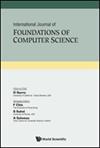Minimizing Maximum Unmet Demand by Transportations Between Adjacent Nodes Characterized by Supplies and Demands
IF 0.6
4区 计算机科学
Q4 COMPUTER SCIENCE, THEORY & METHODS
International Journal of Foundations of Computer Science
Pub Date : 2023-06-23
DOI:10.1142/s0129054123420054
引用次数: 0
Abstract
Suppose we are given a graph with nodes characterized by amounts of supplies and demands of multiple commodities. The amounts of commodities stored at nodes (supplies) are given by positive numbers while those of demands at nodes are given by negative numbers. To meet demands we send commodities from nodes to neighbors by using vehicles, one at each node, with some loading capacity moving to and from neighbors. In this paper we adopt a one-way transportation model in which we just send commodities from a node to one of its neighbors along an edge. When we choose one neighbor at each node, we have a set of trips which naturally define a graph such that each connected component has at most one cycle, which is known as a pseudoforest. We present a linear-time algorithm for deciding whether there is a set of trips that meet all demands using one-way multi-commodity transportations on a pseudoforest with node degrees bounded by a constant. Using the algorithm, we first present an efficient algorithm for finding an optimal set of one-way one-commodity trips that minimize the maximum unmet demand on a pseudoforest, and then extend the idea to a multi-commodity problem on a pseudoforest with node degrees bounded by a constant.通过以供应和需求为特征的相邻节点之间的运输最小化最大未满足需求
假设我们得到一个图,其中的节点以多种商品的供应量和需求量为特征。节点上存储的商品数量(供应)由正数表示,而节点上的需求数量由负数表示。为了满足需求,我们使用车辆将商品从节点发送到邻居,每个节点一辆,并在邻居之间移动一定的装载能力。在本文中,我们采用了一种单向运输模型,在该模型中,我们只需将商品从一个节点沿着边缘发送到它的一个邻居。当我们在每个节点上选择一个邻居时,我们有一组行程,这些行程自然地定义了一个图,使得每个连接的组件最多有一个循环,这被称为伪森林。我们提出了一种线性时间算法,用于确定是否存在一组满足所有需求的旅行,使用节点度为常数的伪森林上的单向多商品运输。利用该算法,我们首先提出了一种有效的算法来寻找一组最优的单向单商品旅行,该旅行使伪森林上最大未满足需求最小化,然后将该思想扩展到节点度为常数的伪森林上的多商品问题。
本文章由计算机程序翻译,如有差异,请以英文原文为准。
求助全文
约1分钟内获得全文
求助全文
来源期刊

International Journal of Foundations of Computer Science
工程技术-计算机:理论方法
CiteScore
1.60
自引率
12.50%
发文量
63
审稿时长
3 months
期刊介绍:
The International Journal of Foundations of Computer Science is a bimonthly journal that publishes articles which contribute new theoretical results in all areas of the foundations of computer science. The theoretical and mathematical aspects covered include:
- Algebraic theory of computing and formal systems
- Algorithm and system implementation issues
- Approximation, probabilistic, and randomized algorithms
- Automata and formal languages
- Automated deduction
- Combinatorics and graph theory
- Complexity theory
- Computational biology and bioinformatics
- Cryptography
- Database theory
- Data structures
- Design and analysis of algorithms
- DNA computing
- Foundations of computer security
- Foundations of high-performance computing
 求助内容:
求助内容: 应助结果提醒方式:
应助结果提醒方式:


